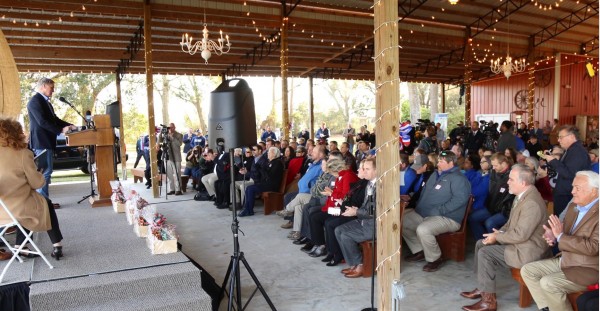SACRAMENTO, Calif. - Howling winds, pelting rain and heavy snow pummeled California on Friday, toppling trees, flipping big rigs, cutting power to more than a million people and threatening mudslides in fire-scarred areas.
Flights were grounded and highways closed in Northern California as gusts reached 80 mph during the second wave of an arctic storm that sent trees crashing onto houses, cars and roads. Forecasters expected the storm to dump as much as 10 feet of snow in the Sierra Nevada by Sunday.
The heavy snow was slowing search efforts for a family believed to be missing in the mountains, authorities said.
Highways from Sacramento to San Francisco were closed because of debris or toppled big rigs blocking lanes, and local roads were flooded. Interstate 80 was closed in the Sierra, the main link between Northern California and Nevada.
"A huge tree, over 100 years old, just fell across the house. It just wrecked the whole thing," said Faye Reed, whose daughter Teenia owns the damaged home north of Sacramento. "They won't be able to live in it. The whole ceiling fell in, and now it's raining inside."
More than a million people from the Bay Area to the Central Valley were in the dark. Crews worked to restore power, but it could be days before all the lights are on, said Pacific Gas & Electric spokeswoman Darlene Chiu.
In Southern California, authorities in Orange County ordered residents to evacuate about 1,000 homes in four canyons scarred by wildfires and prone to mudslides.
"It's too late once the rain starts. These areas are extremely vulnerable. You're risking your life and your family's life fundamentally" by ignoring orders, said Steve Sellers of the governor's Office of Emergency Services.
Riverside and San Bernardino counties, east of Los Angeles, deployed swift-water rescue teams in case torrential rains bring flash floods and mudslides. The state opened its emergency operations center Friday morning to coordinate storm response, and Gov. Arnold Schwarzenegger said he had spoken with Homeland Security Secretary Michael Chertoff by phone.
"Preparation is really the heart of this whole thing," Schwarzenegger said after touring the state emergency operation center at the Los Alamitos Joint Training Base.
Homeowners in Southern California stacked sandbags and hay bales around their homes while residents in the low-lying areas of the Central Valley piled sandbags to barricade their homes from streams that forecasters warned might swell.
Yosemite National Park rangers and sheriff's deputies combed the Sierra foothills and mountain snow camps Friday afternoon searching for a Clovis man and his two children, said Clovis police spokeswoman Janet Stoll-Lee.
John Hopper, 64, a volunteer chaplain with the Clovis police, left town Thursday morning with his 15-year-old twins, Matt and Sarah, to "go play in the snow," Stoll-Lee said.
The family didn't give any indication of where they were heading, and law enforcers heard they were missing only when Hopper's ex-wife reported they hadn't returned late Thursday, she said.
Travelers' flight plans were put on hold when airlines delayed or canceled flights in Sacramento and the San Francisco Bay Area. The state Legislature in Sacramento closed offices and sent employees home early.
A wind gust of 125 mph was recorded in the Sierra on Friday afternoon, the National Weather Service said.
The huge storm also toppled trees and cut power to thousands of residents in Washington and Oregon.
Meanwhile, a freeze in the East subsided. Florida's citrus growers weathered the cold largely unscathed, but strawberry and tomato growers watched as some of their crops shriveled.
A serious freeze would have devastated Florida's citrus trees, already struggling from years of diseases and hurricanes.
A better picture of crop damage could come Monday, when the U.S. Department of Agriculture releases a weekly progress report.
At Bill Baggs Cape Florida State Park in Key Biscayne, iguanas fell out of trees Thursday. The cold-blooded reptiles go into a sort of hibernation when temperatures get too low, even if they are perched in branches. Most woke up when the weather warmed later in the day.
Thursday
July 3rd, 2025
5:51PM

















